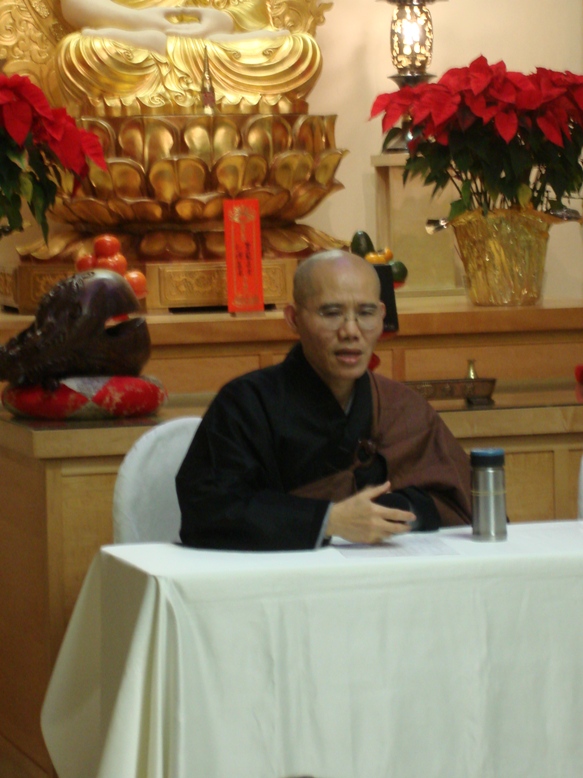
Chan Series - Part 3
How Not to Get Sick
By
Chang Jie
01/18/2009

On Sunday, January 18, 2009, Venerable Guo Xing continued the dharma lecture series on Chan
with a talk on "How Not to Get Sick". Venerable explained that when we meditate, we may
experience peace and harmony in body and mind. When we compare our physical and mental
states during our ordinary, daily lives, to those experienced in meditative states, we
may realize how much discomfort we feel in everyday life.
According to Venerable, a person can be:
* Sick in both the body and the mind
* Not sick in the body, but sick in the mind
* Sick in the body, but not sick in the mind
* Neither sick in body or mind
Illnesses of both body and mind are a double affliction. Sickness of the body may be
limited in duration, but mental and emotional afflictions may be limitless. Over time,
these mental afflictions may even manifest into physical illnesses.
According to Chinese medicine, we are all physically unwell on some level due to imbalances in
the four elements or the chi. A Western psychologist once said that we are all psychologically
unwell to some degree. According to Buddhism, greed, hatred and ignorance are three poisons,
or mental afflictions. Mistaking the thoughts in our minds as real is another type of delusion.
Yet, we do not think of these mental experiences as illnesses. In fact, we may grasp onto hatred
and never consider going to the hospital to treat this affliction. Those who have not learned
Buddhadharma especially may not be aware of the afflictions of the mind and pay attention only to
the sicknesses of the body.
It is very difficult to find a person who is neither sick in the body nor sick in the mind. In fact,
those who are in the first three states mentioned above are typical, while the last is very rare.
Those who have no afflictions of the mind are arhats and Buddhas; they are free from greed, anger
and ignorance. While greed and anger are relatively straightforward concepts, ignorance may be a
bit more difficult for us to understand.

When we meditate, we may be able to lessen the illnesses of the body and mind. Meditation may help us
to have higher tolerance for pain; we can train ourselves to tolerate physical illness and perhaps even
have less afflictions of the mind.
According to a sutra relating the virtues of the arhats, there was an arhat who was highly regarded for
having the least sicknesses or vexations. But even arhats are not absolutely free of all sickness and
vexations. Even Shakyamuni Buddha experienced physical illness because of past karmic retribution.
We can follow all the rules to good health, but because of karmic retributions, we may still get sick.
We don’t know what kind of karma we created in the past. We may all have experienced remembering and
reliving a bad experience from childhood. These are the karmic imprints left in our minds.
Venerable referred to lines in the "The Great Compassion Dharani", which states:
"Our present wholehearted minds are complete with a thousand Dharmas and all have supernatural powers
and illuminating wisdom. Our minds are both superior like Buddhas’ and inferior like sentient beings.
Beginingless dark movements block this still brightness.
Contact with things makes us become dim and confused, and
our minds ponder things and become bound. In the equal
Dharma, the notions of self and other arise."

Venerable used the analogy of the mirror and the reflections of the mirror to illustrate the concepts of
the mind and phenomena. The mirror can be seen as the mind and the reflections on the mirror can be seen
as all phenomena, including states of illness. The physical body is merely the form skandha reflected in
the mirror. Like all phenomena, the physical body and illnesses arise and perish, according to causes and
conditions. We mistakenly treat the body and the illness as the real self and spend much time and energy
trying to maintain the body and keep it in a state of comfort. We fail to see the mirror, which is likened
to the dharma body, which never gets sick.
Venerable concluded with a summary of the main points the talk:
* It is best to not be sick in both body and mind.
* To be free from sickness, we should regard the dharma body as the self.
* We should cultivate freeing the mind from sickness.
* To be not sick in the mind is to regard the body as empty and changing.
* We should try to treat the physical body as an object for exhausting past karmic retribution and for cultivating wisdom and virtue.
* The physical body is sick or not sick when compared to a standard concept. If there are no concepts, then the body is not sick.
* When we experience physical pain, we should recognize it merely as phenomena that changes according to karmic conditions, much like
a stage where people come and go. We should not grasp at the pain as the self.
• We should use physical form to cultivate the dharma body.
Master Sheng Yen experiences sickness but uses it as a tool to cultivate and to reach out to others. We should
regard the physical body as a beat up car. As long as it runs, it does not matter how it appears. We should
not waste our energy trying to fix it up. The most important thing is that this body can transport us to the
other shore, which is nirvana.
|